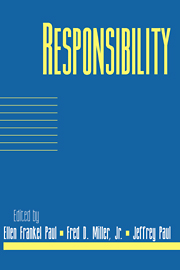Book contents
- Frontmatter
- Contents
- Introduction
- Acknowledgments
- Contributors
- Causation and Responsibility
- Negligence
- Responsibility and Consent: The Libertarian's Problems with Freedom of Contract
- The Irrelevance of Responsibility
- On Responsibility in Science and Law
- Responsibility and the Abuse Excuse
- Why Citizens Should Vote: A Causal Responsibility Approach
- Institutionally Divided Moral Responsibility
- Fate, Fatalism, and Agency in Stoicism
- Ultimate Responsibility and Dumb Luck
- Taking Responsibility for Our Emotions
- Index
On Responsibility in Science and Law
Published online by Cambridge University Press: 06 January 2010
- Frontmatter
- Contents
- Introduction
- Acknowledgments
- Contributors
- Causation and Responsibility
- Negligence
- Responsibility and Consent: The Libertarian's Problems with Freedom of Contract
- The Irrelevance of Responsibility
- On Responsibility in Science and Law
- Responsibility and the Abuse Excuse
- Why Citizens Should Vote: A Causal Responsibility Approach
- Institutionally Divided Moral Responsibility
- Fate, Fatalism, and Agency in Stoicism
- Ultimate Responsibility and Dumb Luck
- Taking Responsibility for Our Emotions
- Index
Summary
introduction
Respon'sible,liable to be called to account or render satisfaction: answerable: capable of discharging duty: able to pay. The old Chambers's dictionary gives a behavioristic view of responsibility: in terms of action, not thought or belief. “Lust in the heart” is not equated to lust in flagrante. It is this view I shall explore in this essay, rather than the more subjective notion of moral responsibility, as in, “I feel moral responsibility (i.e., guilt) for not doing anything to save the Tutsis [Hutus, ethnic Albanians, etc.].” My presumption is that responsibility implies capability: you cannot be held responsible for something over which you have no control (Hutus, ethnic Albanians, etc.). There is obviously uncertainty in some cases–where control is less than total, where the degree of potential control depends on our own efforts, where we cannot know if we have control until we try to exert it, etc. The relation between responsibility and degree of control is a separate topic which I shall not treat here.
Responsibility in the behavioristic sense is also social, we are responsible to some person or group, and therefore it goes beyond the individualistic focus of most psychology and psychiatry. I equate “behavioristic” with “scientific” because it is generally agreed that science deals only with “third-party-confirmable” concepts, “public knowledge” in J. M. Ziman's phrase. I will contend that responsibility in law traditionally has been, and should be, behavioristic, concerned with intersubjectively verifiable actions.
- Type
- Chapter
- Information
- Responsibility , pp. 146 - 174Publisher: Cambridge University PressPrint publication year: 1999
- 1
- Cited by

